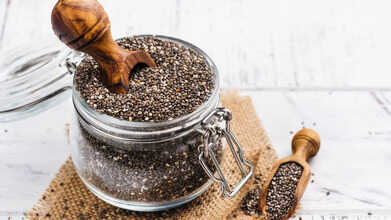- Health Conditions A-Z
- Health & Wellness
- Nutrition
- Fitness
- Health News
- Ayurveda
- Videos
- Medicine A-Z
- Parenting
- Web Stories
Forget Dieting! Can You Lose Belly Fat By Drinking More Water?

Image Credit: canva
While diet and exercise remain the gold standard for weight loss, a surprisingly simple method has caught the attention of health enthusiasts—drinking water. Yes, you read that right! But can increasing your water intake truly help you lose belly fat? The answer is more complex than a simple yes or no. While drinking water isn’t a magic solution, it does play a vital role in weight management and overall health. Let's explore how hydration impacts belly fat and what you can do to maximize its benefits.
Belly fat, also known as visceral fat, is more than just an aesthetic issue. It accumulates around vital organs such as the stomach, liver, and intestines, increasing the risk of severe health conditions like heart disease, diabetes, and metabolic disorders. Unlike subcutaneous fat, which lies just under the skin, visceral fat is more metabolically active, making it harder to lose. The key to reducing belly fat is creating a caloric deficit—burning more calories than you consume. This is where drinking water can help, albeit indirectly.
How Drinking Water Helps With Belly Fat Reduction
While drinking water alone won’t melt belly fat, it supports weight loss in several ways:
1. Suppresses Appetite and Reduces Calorie Intake
One of the simplest ways water aids in weight management is by curbing unnecessary snacking. Sometimes, what we perceive as hunger is actually thirst. By drinking a glass of water before meals or when hunger pangs strike, you can prevent overeating. A 2014 study found that overweight women who drank 500ml of water before meals for eight weeks consumed fewer calories and experienced weight loss.
2. Boosts Metabolism and Enhances Fat Breakdown
Water is essential for the body’s metabolic functions, including lipolysis—the process of breaking down fat molecules for energy. When you’re well-hydrated, your body efficiently burns fat instead of storing it. Additionally, drinking cold water may slightly increase calorie burning as the body works to regulate its temperature.
3. Aids Digestion and Reduces Bloating
Proper digestion is crucial for maintaining a flat stomach. Water helps break down food, facilitating the absorption of nutrients and the elimination of waste. Inadequate hydration can lead to constipation and bloating, making the stomach appear larger. Drinking sufficient water ensures smooth digestion and prevents discomfort associated with bloating.
4. Reduces Liquid Calorie Consumption
Many people unknowingly consume excess calories through sugary beverages like soda, fruit juices, and flavored coffees. Replacing these drinks with water significantly reduces daily calorie intake. Even diet sodas, which contain artificial sweeteners, have been linked to increased belly fat. Opting for water instead of calorie-laden drinks is a simple yet effective strategy for weight management.
5. Enhances Exercise Performance and Fat Loss
Exercise is a crucial component of any weight loss journey, and water plays an integral role in physical performance. It helps dissolve electrolytes, regulates body temperature, and prevents muscle cramps. Dehydration can lead to fatigue, reducing the efficiency of your workouts. Staying hydrated ensures you can exercise effectively, ultimately aiding in fat loss, including stubborn belly fat.
How Much Water Should You Drink To Start Losing Fat?
There’s no one-size-fits-all answer to this question. Water needs vary based on factors such as age, activity level, body weight, and climate. However, general guidelines suggest that women should aim for about 91 ounces (11 cups) of total water per day, while men should target 125 ounces (15.5 cups). A simple way to check hydration levels is by observing urine color—light yellow indicates adequate hydration, whereas dark yellow suggests dehydration.
Practical Tips to Increase Your Water Intake
If you struggle to drink enough water, these simple strategies can help:
- Drink a glass of water before every meal.
- Carry a reusable water bottle and sip throughout the day.
- Infuse your water with lemon, cucumber, or berries for added flavor.
- Set reminders on your phone to drink water at regular intervals.
- Increase intake on hot days or after exercise.
- Consume water-rich foods such as melons, cucumbers, tomatoes, and leafy greens.
While drinking water alone won’t directly burn belly fat, it plays a crucial supporting role in weight loss. It helps control appetite, boosts metabolism, aids digestion, and improves exercise performance. Combined with a balanced diet and regular physical activity, staying hydrated can enhance your journey to a leaner, healthier body. So, the next time you feel hungry or sluggish, reach for a glass of water—it might be the simplest yet most effective step toward achieving your fitness goals.
Croissant In a Gut-Friendly Food, Says NHS Surgeon

Credits: Insta and Canva
Whenever we have to think of a quick food, we think of breads. However, we are usually advised against it, but Dr Karan Rajan, NHS Surgeon has a different view to offer. He says that croissant, if made in the traditional way could actually be a gut-friendly food. “This is my legal argument to explain why croissants should be considered a gut health food. It has to be a traditional croissant because it is made using laminated yeast dough that undergoes slow fermentation. This process allows the yeast and lactic acid bacteria to partially break down some of the starches, making the final product easy to digest compared to under-fermented white bread,” he said.
What Is The Right Way To Have A Croissant?
He suggests that if you let a baked croissant cool down before eating, it helps turn the starch into resistant starch. This, also helps feed the bacteria in the colon. “A croissant eaten mindfully for breakfast allows the body to lessen its said,” he said.
So, Is Croissant Really Better Than Regular Bed?
Experts have suggested that when dough ferments, natural bacteria and yeast partially break down the starches and gluten. This also makes the final product easier to digest and gives it a unique flavor.
Whether or not the croissant is healthy really depends on the way it is made. If the croissant is fermented, it is gut-friendly, otherwise, it is not.
What Should People Keep In Mind?
People must go for fermented bread, as it is easier on the stomach. This is especially good for those who feel bloated after consuming regular bread. The fermented bread will also have a lower glycaemic effect, which means they cause a slower rise in blood sugar as compared to unfermented or regular bread. It is also important to note portion control, however, warn experts.
However, one must keep in mind that while most people can have fermented breads, it should be consumed in moderation.
Are There People Who Cannot Have This Gut-friendly Food?
People with celiac disease or serious gluten intolerance should stay away from them. This is because not always does fermentation remove all the gluten. However, fermented options could be better for those struggling with diabetes, however it should still be eaten in moderation.
What one must keep in mind is that fermented breads are smarter treats, but mot an everyday meal. For everyday meal, try to balance it with whole grains, millets, and high-fibre foods.
Dr Ulysses Wu, MD, with Hartford HealthCare also noted that sourdough, which is also a type of fermented bread could have potential health benefits.
“The long fermentation process partially breaks down gluten and phytic acid, a compound that could block mineral absorption. For many people, that makes sourdough easier on the stomach,” Dr. Wu notes.
The fermentation process, he says could lower glycemic index, which could help with blood sugar control. Furthermore, it is high in prebiotics, which can act like fuel for the healthy bacteria already in your gut.
However, he also notes that fermentation does not fully remove gluten, so it must be consumed in moderation.
8 Cups Of This Drink Can Help Increase Your Longevity But More Than That Could Increase Your Risk Of Heart Diseases

(Credit-Canva)
One of the major point of conversations right now is longevity. People are learning day by day about what may affect their biological age and how, why and which way they can lower it. Many studies have pointed out that things like sugar, and some drinks may lower it, however, a new study shows that there may be some unexpected heroes among our daily drink consumption.
A study recently published in the British Journal of Nutrition showed something interesting: drinking about seven to eight cups of tea, coffee, and plain water every day might help you live longer.
Researchers looked at the drinking habits of over 182,000 people and found that hitting this total number of drinks, when balanced well, offered the best protection. It lowered the risk of dying from all kinds of serious problems, including cancer and heart disease. The main finding is that the mix of drinks is key—it's not good to overdo it, as too much might actually be bad for your heart.
How Do Tea, Coffee Or Water Help Your Health?
The research figured out the best possible way to combine these drinks to get the most health benefit:
Optimal Daily Total
The number one rule is to drink a total of seven to eight beverages every day. This total includes your water, coffee, and tea.
Coffee and Tea Ratio
Once you're hitting that daily goal, the best way to mix the coffee and tea is in a 2:3 ratio. This means for every two cups of coffee, you should have three cups of tea. This specific blend was found to be the most powerful for protecting you against dying from heart problems, cancer, and diseases of the lungs and stomach.
Hydration
The experts stress that the most important thing is to just stay hydrated first. Get your total number of drinks up to seven or eight. After you've done that, then you can start swapping some of your water for the healthier mix of coffee and tea.
How Much Tea Or Coffee Should You Drink?
The study also came with important warnings about drinking too much or too little of the mix:
If You Drink Very Little: If you currently have less than four total drinks a day, just adding a cup of coffee or tea won't help much. You need to focus on drinking more water first to reach the main goal of being fully hydrated.
If You Drink Too Much: If you are drinking nine or more cups of fluid a day, replacing water with more tea or coffee could actually raise your risk of dying from heart disease. More is not always better! Finally, the scientists noted two important things:
They can only say there's a link (an observation) between the drinks and living longer; they can't say for sure that the drinks are the direct cause of longer life. The study didn't know how people prepared their drinks—whether they added a lot of sugar or milk, which could affect the health benefits. The main takeaway is to focus on getting your overall daily fluid intake to seven to eight drinks and then use the beneficial mix of coffee and tea wisely.
Is It Safe to Eat Chia Seeds During Pregnancy? Expert Explains

Credits: Canva
Pregnancy is a unique and exciting journey, full of changes, decisions, and the constant desire to give your baby the best start in life. Nutrition becomes particularly important during this time, as what a mother eats can impact both her own health and the development of her baby. One ingredient that has been gaining popularity among expectant mothers is chia seeds.
Though tiny, these seeds are packed with nutrients and can be a versatile addition to a pregnancy diet. To understand their benefits, we spoke with Dr. Deepa, Senior Consultant at Yashoda Super Speciality Hospital Kaushambi, who shared how chia seeds can support maternal and fetal health.
Benefits of Chia Seeds for Pregnant Women
Chia seeds are simple to incorporate into daily meals as you can sprinkle them on oatmeal, mix them into yogurt, blend them into smoothies, or even add them to baked goods.
Their mild taste and texture make them easy to enjoy, which is one reason why many pregnant women are turning to these seeds. According to Dr. Deepa, there are several ways chia seeds can help during pregnancy:
Supports Digestion
Constipation and other digestive issues are common during pregnancy due to hormonal changes and slower digestion. Chia seeds are high in soluble fibre, which can help regulate bowel movements. When soaked in liquid, they expand into a gel-like texture that aids digestion and promotes a feeling of fullness. This not only helps prevent overeating but also supports healthy weight gain, which is important for both mother and baby.
Helps Maintain Blood Sugar Levels
Fluctuating blood sugar levels can be a concern for expectant mothers, sometimes leading to gestational diabetes. The fibre in chia seeds slows sugar absorption into the bloodstream, helping to maintain stable blood sugar and energy levels. By including chia seeds in meals, pregnant women may reduce the risk of sudden sugar spikes and maintain steadier energy throughout the day.
Aids Hydration
Hydration is essential during pregnancy, and chia seeds can play a supportive role. Dr. Deepa points out that chia seeds are versatile and can be added to a wide variety of dishes, from smoothies and salads to yogurt or baked recipes. When mixed with water or other liquids, they absorb moisture, helping to keep the body hydrated and supporting overall wellness.
Nutritional Power for Mother and Baby
Although small, chia seeds are a nutritional powerhouse. They are rich in omega-3 fatty acids, fibre, protein, calcium, and antioxidants. These nutrients support brain development in the fetus, improve digestion, help maintain healthy blood sugar levels, and contribute to overall maternal health.
Dr. Deepa recommends consuming chia seeds in moderation. Eating too many may cause digestive discomfort due to their high fibre content. A typical portion is about one to two tablespoons per day. She also emphasizes that pregnant women should consult their healthcare provider before making significant dietary changes, especially if they have pre-existing medical conditions.
Including chia seeds as part of a balanced, varied diet can help pregnant women feel nourished, support digestion and hydration, and provide essential nutrients for their growing baby. With their versatility and health benefits, chia seeds are a convenient and powerful addition to a pregnancy-friendly diet.
© 2024 Bennett, Coleman & Company Limited

